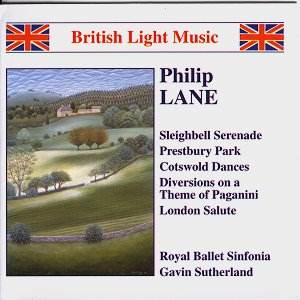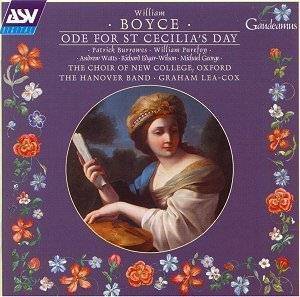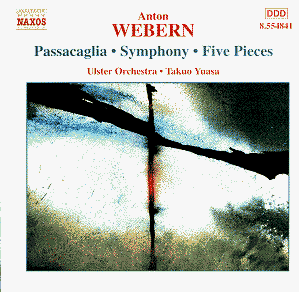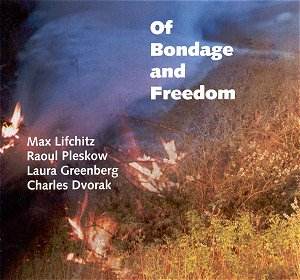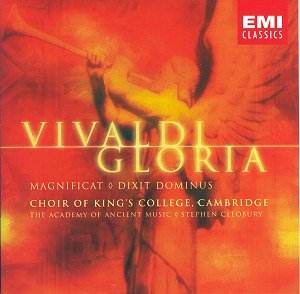 Composer: Antonio Vivaldi
Composer: Antonio Vivaldi
Works: Gloria in D Major RV 589, Dixit Dominus in D Major RV 594, Magnificat in G Minor RV 610
Performers: Sarah Fox (soprano), Deborah Norman (soprano), Michael Chance (counter-tenor), James Gilchrist (tenor), Jonathan Lemalu (bass), Choir of King’s College Cambridge, The Academy of Ancient Music conducted by Stephen Cleobury
Recording: Recorded in the Chapel of King’s College Cambridge, March/July 2001
Label: EMI
Antonio Vivaldi, a luminary of the Baroque era, is often best remembered for his vigorous concertos, yet his sacred choral works reveal a different facet of his genius. This recording features three major works: the celebrated “Gloria,” the imposing “Dixit Dominus,” and the early “Magnificat.” Each piece showcases Vivaldi’s distinct compositional style, characterized by vibrant rhythms, bold contrasts, and a vivid orchestral palette—elements that Stephen Cleobury and his accomplished ensemble, The Academy of Ancient Music, navigate with finesse.
The “Gloria,” undeniably the main attraction here, unfolds through eleven succinct movements, each brimming with melodic inventiveness and rhythmic vitality. Cleobury’s direction emphasizes the work’s dynamic contrasts, particularly in the exuberant “Laudamus te,” where sopranos Sarah Fox and Deborah Norman deliver their lines with extraordinary clarity and expressive joy. Their duets are marked by a palpable sense of camaraderie, while Michael Chance’s counter-tenor in the “Domine Deus, Rex Coelestis” brings a warm, expressive depth to the text. The choir, composed of King’s College voices, showcases a disciplined yet radiant sound, perfectly suited to Vivaldi’s intricate choral writing.
Transitioning to the “Dixit Dominus,” we encounter a more ambitious and grandiose structure. Composed during Vivaldi’s tenure at the Ospedale della Pietà, this work reflects his ability to blend operatic fervor with liturgical solemnity. Cleobury takes a bold approach, particularly in the vigorous opening that echoes Handelian grandeur, characterized by trumpet fanfares and a rich orchestral backdrop. James Gilchrist’s tenor shines in the aria “Dominus ad dextris tuis,” where his clear, ringing tone perfectly captures the text’s majesty. Jonathan Lemalu’s bass adds gravitas, especially in the dramatic “Judicabit in nationibus,” showcasing the work’s potential for theatrical expression.
The “Magnificat,” an earlier composition from approximately 1715, is often overshadowed by the more famous “Gloria.” Yet, Vivaldi’s early work deserves greater recognition for its imaginative orchestration and dramatic contrasts. The opening chorus is strikingly chromatic and charged, a precursor to the more mature style found in his later works. The interplay between the choir and soloists is particularly effective in the “Et exultavit,” where Vivaldi’s orchestral textures vividly illustrate the text’s jubilant themes. Cleobury’s interpretation here brings out the frenetic energy of the orchestra, creating a compelling sonic tapestry.
The recording quality is commendable, capturing the reverberant acoustics of King’s College Chapel without overwhelming the clarity of individual lines. EMI has successfully mastered the balance between the choral forces and the instrumental accompaniment, allowing each section to shine through while maintaining an overall cohesive sound. This is a significant improvement over some of their previous recordings from the venue, demonstrating an increasingly sophisticated approach to engineering.
While comparisons with notable alternatives, such as the Naxos version conducted by the Schola Cantorum of Oxford, are inevitable, this recording stands out for its authentic use of original instruments and the vibrant energy of Cleobury’s direction. The precision and emotional depth brought forth by the soloists and the choir elevate this performance, making it a compelling choice for both collectors and casual listeners alike.
This recording of Vivaldi’s sacred works not only preserves the essence of the compositions but also reveals the emotional core of the music. Cleobury and his ensemble have crafted a performance that is both technically proficient and deeply engaging, ensuring that these Baroque masterpieces resonate with clarity and passion. The artistry displayed throughout is a testament to Vivaldi’s enduring legacy and the continuing relevance of his sacred music in the concert repertoire.
